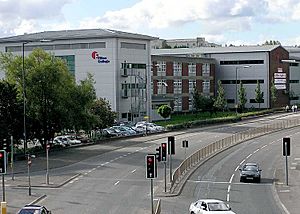Education in Bristol facts for kids
Bristol is a big city in South West England. It's a key place for culture, learning, and universities in the region. The city has two important universities: the University of Bristol, which is an older, well-known university, and the University of the West of England, which is a newer university with a high ranking. Bristol is also known for its focus on science and engineering, especially its strong connections to the aerospace industry.
Contents
Learning in Bristol
Bristol offers many ways to learn, from primary school to university.
Schools for Everyone

Bristol has 129 schools for younger children, including infant, junior, and primary schools. There are also 17 secondary schools and three special learning centres.
Bristol also has many independent schools. Some well-known ones are Clifton College, Clifton High School, Badminton School, Bristol Grammar School, Queen Elizabeth's Hospital (which is only for boys), and the Redmaids' High School. Redmaids' High School was started in 1634, making it England's oldest girls' school still open today!
After Secondary School
After secondary school, many students go to a sixth form or college.
Sixth Forms
Bristol has three main sixth forms where students can study for their A-levels or other qualifications before university. These are St. Brendan's Sixth Form College, North Bristol Post 16 Centre, and Redcliffe Sixth Form Centre. St. Brendan's is located in Brislington, while Redcliffe Sixth Form is closer to the city centre, near Bristol Temple Meads station.
Colleges
Bristol has two main colleges: City of Bristol College and South Gloucestershire and Stroud College. City of Bristol College has its main site near College Green and other smaller sites around the city. South Gloucestershire and Stroud College has campuses in Central Bristol, Stoke Gifford, and Filton. These colleges offer a wide range of courses, including vocational training and higher education programs.
University Life
Bristol is home to two major universities: the University of Bristol and the University of the West of England (UWE).
University of Bristol
The University of Bristol is a very respected university, first opened in 1909. It's part of the Russell Group, which is a group of leading UK universities known for their research. The university has about 15,000 students. It is especially strong in subjects like Mathematics, Medicine, Engineering, Psychology, Economics, Biology, Chemistry, Management, Politics, and Law. The University of Bristol often ranks among the top universities in the UK and even worldwide.
University of the West of England (UWE)
UWE, which became a university in 1992, is the larger of the two universities in Bristol, with around 35,000 students. Many students at UWE come from state schools.
Other Higher Education Options
The University of Law also has a campus in Bristol. The city also has two further education colleges (City of Bristol College and South Gloucestershire and Stroud College) and three colleges that focus on religious studies: Trinity College, Wesley College, and Bristol Baptist College.
In 2008, the Bristol Institute of Modern Music opened, offering music degrees. More recently, in 2021, South Gloucestershire and Stroud College opened a University Centre at its WISE Campus, where students can study for degrees in sports and performing arts.
Science in Bristol
Bristol is a hub for science and innovation.
A "Science City"
In 2005, Bristol was named one of six "science cities" in England. This means it's a place where science and technology are very important. A large Bristol and Bath Science Park was planned to help with scientific research and development.
You can see science in action at places like At-Bristol (a science centre), the Bristol Zoo, and the Bristol Festival of Nature. These places help people learn about science in fun and interactive ways.
Famous Scientists from Bristol
Bristol has been home to many important scientists:
- Humphry Davy: A chemist from the 1800s who worked in Hotwells.
- Paul Dirac: A physicist from Bishopston who won the Nobel Prize in 1933 for his work on quantum mechanics.
- Cecil Frank Powell: A professor at the University of Bristol who won the Nobel Prize in 1950 for his discoveries in physics.
- Colin Pillinger: A planetary scientist known for the Beagle 2 project, which aimed to land on Mars.
- Richard Gregory: A neuropsychologist who created a hands-on science centre, which was a predecessor to At-Bristol.
Bristol is also home to Adam Hart-Davis, who presents science TV shows, and psychologists like Susan Blackmore and Derren Brown.
Encouraging Future Scientists
Projects like the Flying Start Challenge encourage secondary school students in Bristol to get interested in science and engineering. There are also strong connections with aerospace companies, which help students learn about design and technology.
The Bloodhound SSC project, which aims to break the land speed record, is based at the Bloodhound Technology Centre on Bristol's harbourside. This project shows how cutting-edge engineering is happening right in the city!
 | Stephanie Wilson |
 | Charles Bolden |
 | Ronald McNair |
 | Frederick D. Gregory |


